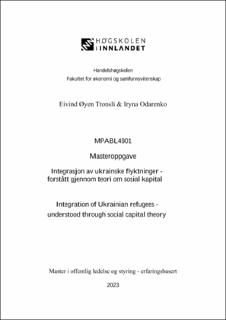Integrasjon av ukrainske flyktninger - forstått gjennom teori om sosial kapital
Abstract
Krigen i Ukraina som brøt ut i fjor vinter har ført til at mange ukrainere har måtte forlate sinehjem og flykte til utlandet. Flere tusen av ukrainske flyktninger har kommet til Norge, og detforventes tusentalls av ankomster i årene som kommer. Den nye flyktningstrømmen har skaptenormt press på tjenestene som jobber rundt flyktninger i kommunene. For å lette på dettepresset og sikre rask integrering av de nyankomne flyktningene har myndighetene innført enrekke lovendringer både som omhandler mottak og kvalifisering.
Formålet med studien er å avdekke kommunenes strategier for tilpasning til de endredebetingelsene for mottak og integrering av ukrainske flyktninger under første fase av denukrainske flyktningkrisen. Kunnskapen om dette kan være nyttig for planlegging av tiltakinnenfor flyktningarbeid i andre norske kommuner, herunder både under den pågåendeflyktningkrisen og eventuelt andre flyktningkriser eller flyktningstrømmer i fremtiden.Studien tar utgangspunkt i flyktningarbeid i to case-kommuner, der søkelyset særlig rettes motmuligheter og utfordringer for integrasjonsprosesser i en kommunal kontekst. Det teoretiskegrunnlaget for oppgaven er teorier om sosial kapital og dets operasjonalisering av Ager &Strang (2008) som gir bedre forståelse for integrasjon som prosess. Studien er basert påempiriske data innhentet gjennom semistrukturerte intervjuer med informanter fra de torespektive case-kommunene. Dataanalysen er gjennomført ved hjelp av tematisk analyse avde transkriberte intervjumaterialene.
Funnene viser at til tross for gode hensikter har ikke alle elementene i det endrede lovverketfungert i henhold til hensikten med tanke på raskere integrering eller redusert press påkommunene. Kommunenes egne tilpasningsstrategier til de endrede betingelsene for mottakog integrering av den nye flyktninggruppen har vært svært forskjellige som også førte til heltulike utfall både med tanke på tjenestekvalitet, bredden av tilbudet og graden av individuelletilpasninger. Dette viste seg å ha implikasjoner når det gjelder forutsetninger for dannelse avsosial kapital og dermed integrering av denne gruppen. Den ukrainske flyktninggruppen harvist seg til å være generelt mer ressurssterk enn de andre flyktninggruppene, særlig med tankemed humankapital. Samtidig har denne flyktninggruppen flere utfordringer på noen andreområder som utgjør hinder for integrasjon og krever dermed nye tilnærminger. The war in Ukraine that broke out last winter has led many Ukrainians to have to leave theirhomes and flee abroad. Thousands of Ukrainian refugees have come to Norway, andthousands of arrivals are expected in the years to come. The new refugee stream has createdtremendous pressure on the services working around refugees in the municipalities. In orderto reduce this pressure and ensure rapid integration of the newly arrived refugees, theauthorities have introduced a number of legislative amendments both that dealt with receptionand qualification.
The purpose of the study is to uncover the municipalities' strategies for adaptation to thechanged conditions of the reception and integration of Ukrainian refugees during the firstphase of the Ukrainian refugee crisis. Knowledge of this can be useful for planning measuresin refugee work in other Norwegian municipalities, including both during the ongoing refugeecrisis and possibly other refugee crises or refugee flows in the future. The study is based onrefugee work in two case municipalities, where the spotlight is particularly focused onopportunities and challenges for integration processes in a municipal context. The theoreticalbasis for the thesis is theories of social capital and its operationalization of Ager & Strang(2008) that provide a better understanding of integration as a process. The study is based onempirical data obtained through semi-structured interviews with informents from the tworespective case municipalities. The data analysis is carried out using thematic analysis of thetranscribed interview materials.
The findings show that despite good intentions, not all the elements of the changed legislationhave worked according to the purpose regarding faster integration or efforts to reduce thepressure on the municipalities. The municipalities’ own adaptation strategies to the changedconditions for reception and integration of the new refugee group have been very differentwhich also led to completely different outcomes both in terms of service quality, the breadthof the offer and the degree of individual adjustments. This was found to have implicationswhen it comes to conditions for the formation of social capital and thus integration of thisgroup. The Ukrainian refugee group has proven to be generally more resourceful than theother refugee groups, especially with regard to human capital. At the same time experiencethis refugee group several challenges in some other areas that constitute an obstacle tointegration and thus require new approaches.
